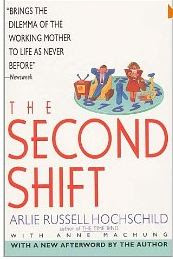I found this interesting website called
The Primary Dilemma. It addresses the needs of working mothers, recognizing that working mothers are not all the same. It's a tool to help us clarify the dilemma of work-family choices (or non-choices) that working mothers face. I took the quiz and the result showed that I'm in 'Obliged' category thus recommended
Obliged working mother method. The founder of this tool, Lynn Hall, shares her story on the home page of the website. It was when her baby was sick so she couldn't take her to the daycare, and her husband was away on business.
When my husband arrived home that night I said “I need your help tomorrow if the baby is sick.” And he said “Look, I can’t share the day to day parenting. My job won’t allow it. You need to be that person. Your work is important, don’t stop working. If we need a nanny, let’s get one. If you need to change your job, do it. I support you. But you need to be the primary parent.”
Wow, the PRIMARY DILEMMA™ had hit me like a ton of bricks! I had to redefine what it meant for me to “do well” as a mom, employee and person.
I wanted to work. But I also wanted to be physically present for my daughter. The realization of my dilemma guided me to re-engineer my plan for working motherhood. Re-engineering my plan meant finding: 1) an employer closer to home, 2) a work environment that supported flexible schedules and 3) a position that demanded less travel. I found all of that. And with a crazy combination of enthusiasm and remorse, I embraced the chance to learn how to be a working mother in an environment that supported it. But it did come with the price of decelerating my career for a period of time. Fortunately, the self-awareness that I had for my dilemma enabled me to stay in the workforce instead of opting out.
In her story, she found all that she needed. Good for her. Now what I need is more or less the same: 1) an employer closer to home, 2) a work environment that supports flexible schedules and 3) a position that demands very little travel. For me this method could be transitional or a philosophical approach to a work-family balance where work is only one part of living--I haven't decided yet. On the page of The Obliged, Hall recommends us to be conscious of little things like commute time, because they make great differences. Like,
A short commute can make an enormous difference in enabling the balance between work and family. You can make it to the school play or a child’s dentist appointment, all in the course of a work day.
But that example is so not applicable if you are a Jakarta commuter like me! Commute time is at least one hour if the traffic is 'normal'.
So I'm still trying to find: 1) An employer closer to home. There are choices nearby, but... 2) a work environment that supports flexible schedules. But as I mentioned before, flexible schedules are not common here. Although demands for mothers to work to contribute to their husbands' incomes are increasing, working mothers' needs for work-family-self balance is not yet recognized. So, finding 3) a position that demands very little travel should come after I get number 1) and 2). That is not common here, so it's not easy to find. Most stay-at-home moms I know (in my country, or especially in the area of greater Jakarta) work in multi-level marketing, or self-employed selling imported baby/kids clothes online. But I see too many people are already doing that, besides they are not so interesting to me personally.
The perception at work is that I am on the “mommy track” instead of the “fast track”. Additionally, most of my peers are men with stay at home wives, so they have limited understanding of what I am trying to accomplish.”
There is a link on the Primary Dilemma website to this book entitled
The Second Shift. Here's a short description of the book on Amazon:
In this landmark study, sociologist Arlie Hochschild takes us into the homes of two-career parents to observe what really goes on at the end of the "work day." Overwhelmingly, she discovers, it's the working mother who takes on the second shift. Hochschild finds that men share housework equally with their wives in only twenty percent of dual-career families. While many women accept this inequity in order to keep peace, they tend to suffer from chronic exhaustion, low sex drive, and more frequent illness as a result. The ultimate cost is the forfeited health and happiness of both partners, and often the survival of the marriage itself.
I found it interesting and 'uh-oh'...it's a warning too. So now what should I do? (block) じゃ、どうすればいいの?

